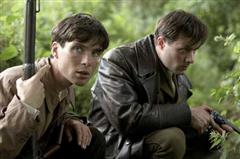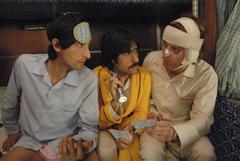 With an onslaught of documentaries and dramas trying to dissect the war in Iraq, my vote for an excellent movie that explores the downfall of political and religious ideology is the recently released 2006 Cannes Film Festival winner, “The Wind That Shakes The Barley.”
With an onslaught of documentaries and dramas trying to dissect the war in Iraq, my vote for an excellent movie that explores the downfall of political and religious ideology is the recently released 2006 Cannes Film Festival winner, “The Wind That Shakes The Barley.”
I’ve always been fascinated by Ireland’s long, bloody history – mainly because it has always been so difficult for me to completely understand it–but “Barley” ( the title comes from a tragic Celtic song lyric) beautifully and simply traces the early efforts of the Irish Republican Army in a way that gives new insight while provoking serious reflection. The poetic storytelling style of “Barley” makes this indie hit my DVD pick for this week.
Beginning during the early days of the Irish War for Independence, the movie starts predictably enough with two brothers living a poor but simple life in the Irish countryside. They are on opposite sides of the political fence– one is involved in the IRA and one wants nothing to do with the rumblings of war – until two tragic incidents finally convince the younger brother Damien (the brilliant Cillian Murphy of “Red Eye” and “Batman Begins” fame) to quit his dreams of medical school in London and join his brother Teddy in the resistance effort.
What hooked me into the story, however, are the early scenes in which Damien and Teddy create their own form of a no frills boot camp in the lush, rolling green hills surrounding their village. These men are not who you’d expect to be forming a guerrilla-style army. They are simple men with simple dreams for their families who are fueled by a sense of desperation. Their sense of honor and the depth of affection they have for their wives and children, as well as for each other, doesn’t seem the least bit sinister or immoral.
“Barley” presents many ideas worthy of debate in a way that only great cinema can. For me personally, the essential lingering lesson of “Barley” is found in the conversation Damien has at the end of the film when he explains to his brother why he cannot stop fighting for the cause. If he did, it would diminish the moral price he already paid by committing an unthinkable act years earlier. It is exactly this kind of flawed logic that explains why certain political and religious revolutions continue for decades and even longer. Or as Damien says in his final letter home: “It’s easy to know what you are against; quite another to know what you are for.”

